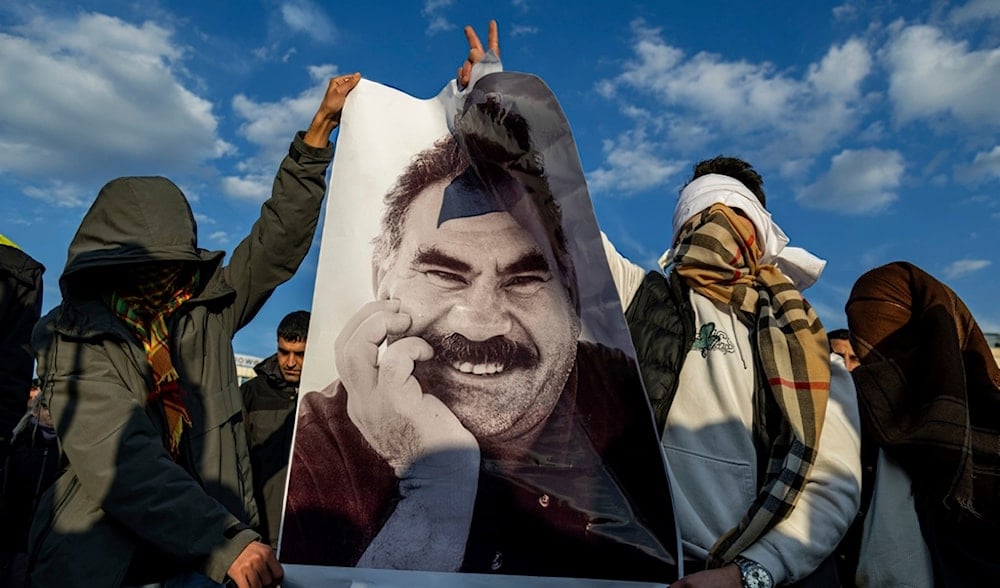In first appearance since 1999, Öcalan announces end of PKK militancy
PKK leader Abdullah Öcalan declares the end of the PKK group’s armed struggle in a historic shift, calling for voluntary disarmament, democratic reform, and Turkish parliamentary oversight of the peace process.
-

Youngsters hold a photograph of Abdullah Ocalan, the jailed leader of the militant Kurdish group, or PKK, in Diyarbakir, Turkey, on February 27, 2025. (AP)
Abdullah Öcalan, the jailed leader of the banned Kurdistan Workers’ Party (PKK) in Turkey, has declared an official end to the group’s armed struggle against the Turkish state. In a video message, his first since his imprisonment in 1999, Öcalan called for a complete shift toward democratic politics, pledging that the PKK would abandon arms "swiftly."
The message, recorded in June and published by Firat News Agency on Wednesday, called on the Turkish parliament to form a committee to oversee a voluntary disarmament process and to launch a broader peace initiative.
Öcalan described the move as a "historic victory," emphasizing the group's commitment to ending its armed campaign and fully embracing legal and democratic methods.
"To fulfill our pledges, the armed struggle must end voluntarily, and the transition to legal, democratic politics must begin,” Öcalan said. “The means for disarmament will be defined, and practical steps will follow promptly.”
Read more: PKK urges Turkey to ease Ocalan's imprisonment
Ending the PKK's separatist agenda
Öcalan stated that the PKK has renounced its separatist agenda and its national liberation strategy, noting that the recognition of Kurdish identity in Turkey renders the party’s original goal fulfilled, and therefore, its continued armed presence would be redundant.
He reaffirmed support for the "Peace and Democratic Society Declaration" issued on February 27, 2025, considering the 12th PKK Congress’s positive reception of the declaration a key turning point.
"The era of armed resistance aimed at countering the denial of Kurdish identity and seeking an independent state has come to an end," he stated. "Since the core objective has been realized, the party’s role has concluded."
Proposal for public disarmament mechanism
Öcalan called for weapons to be surrendered openly to relevant authorities and before the public to eliminate doubts and validate the seriousness of the peace process. He emphasized the importance of forming a legal disarmament mechanism under parliamentary oversight.
“Moving from armed struggle to democratic politics is not a loss, but a historic achievement,” Öcalan stressed.
He also underlined that the People’s Equality and Democracy Party (DEM), represented in the Turkish parliament, would share responsibility for facilitating the process alongside other political parties.
Öcalan appealed for careful and sensitive steps without falling into counterproductive debates, stressing that he trusts the sincerity of those involved and urged all parties to contribute to building a peaceful and democratic society.
"The PKK has abandoned the goal of a nation-state and, with it, its combat strategy," he noted, adding that "From this historic moment, we must move forward collectively and constructively."
Personal freedom and societal liberation
Addressing the question of his personal freedom, Öcalan reiterated that he never viewed it as a private matter, but rather as intrinsically linked to the freedom of society. He affirmed his commitment to this principle and welcomed all forms of criticism, proposals, and contributions to help shape the new phase.
“I am optimistic and excited,” he said, “because these discussions will elevate all of us, the forces of democratic modernity, to a new phase in theory, strategy, and regional and global tactics.”
Turkey and the PKK came to an agreement aimed at ending the decades-long armed conflict and transitioning the group entirely into legal political activity, after reaching a ceasefire in March.
According to the report, the terms of the deal include the full cessation of both military and political confrontation by the PKK, the dissolution of the organization, and the enforcement of a complete ban on PKK-related activities across Turkey, Iraq, Iran, and Syria. The agreement also outlines a process for disarmament to be coordinated by a joint committee, with the PKK’s presidential council overseeing its execution.
Read more: PKK announces dissolution after four-decade insurgency against Turkey

 4 Min Read
4 Min Read










